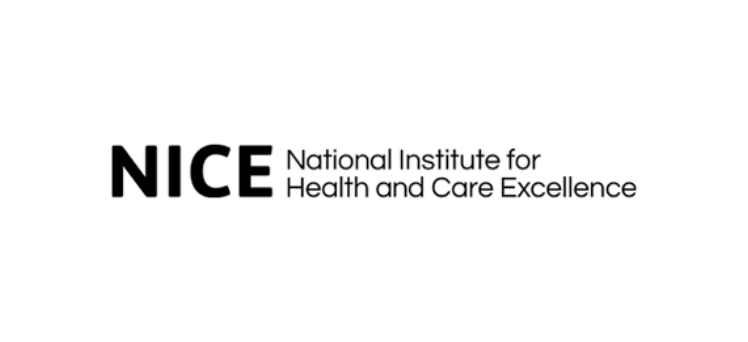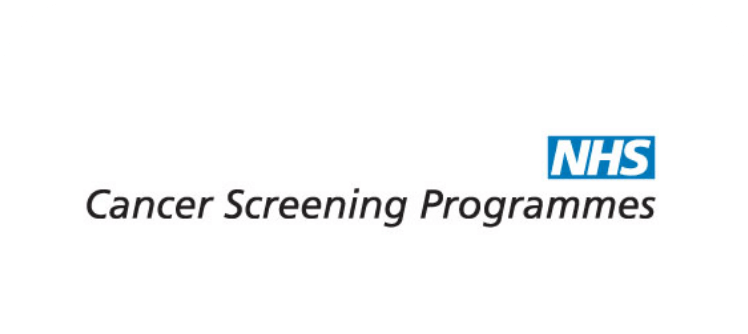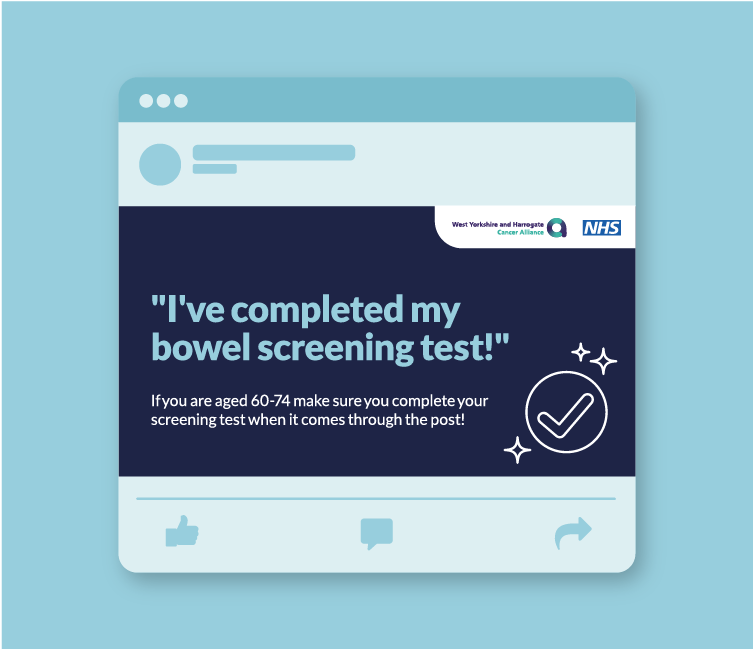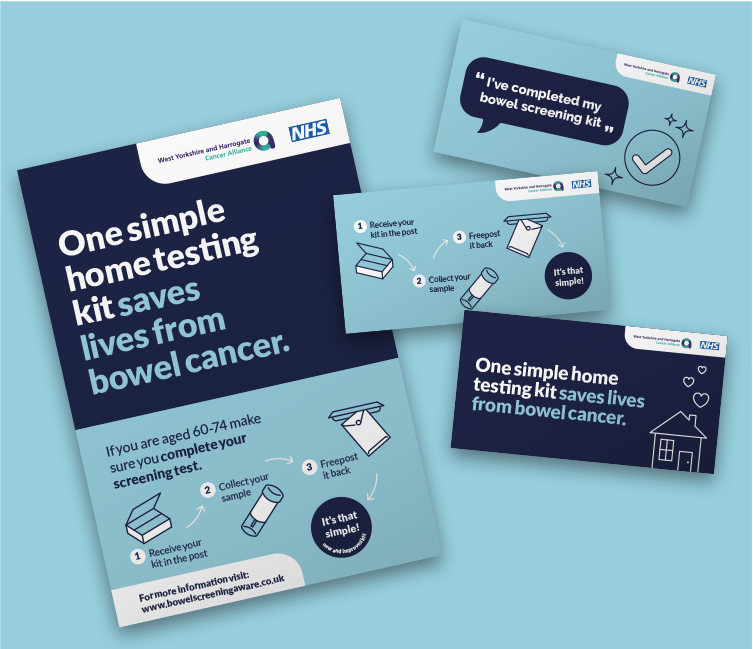One simple home testing kit saves lives from bowel cancer.
If you are aged 60-74 make sure you complete your screening test
About bowel cancer screening
About bowel cancer screening
Bowel cancer is the fourth most common cancer in the UK. It affects both men AND women. Most people diagnosed with it are over the age of 60. It is the second biggest cancer killer. But bowel cancer is treatable and curable – especially if diagnosed early. Nearly everyone survives bowel cancer if diagnosed at the earliest stage. Bowel screening saves over 2000 lives every year in the UK by picking up bowel cancers early as well as preventing them.
But, figures show that bowel screening uptake is declining across West Yorkshire. We want to change that.
Who is eligible?

60 – 74 years old
All men and women who are between 60 and 74 years old are eligible for a bowel screening test.
The process
A simple home testing kit that looks for tiny amounts of blood in the poo. You take a single poo sample after a bowel movement in the privacy of your own bathroom, then post the sample off to a lab for analysis.
-
 Step 1:Receive your kit in the post
Step 1:Receive your kit in the post -
 Step 2:Collect your sample
Step 2:Collect your sample -
 Step 3:Freepost it back
Step 3:Freepost it back
Common questions
Getting to 60 and beyond comes round all too quickly! But it’s a surprise to most people that screening for bowel cancer also comes along when you hit that milestone. Many people will never even have thought about bowel cancer, so it’s not surprising you may have a few questions.
Question
What’s involved?
A simple home testing kit that looks for tiny amounts of blood in the stool. You take a stool sample after a bowel movement in the privacy of your own bathroom, then post the sample off to a lab for analysis.
Step 1 – Receive your kit in the post
Step 2 – Collect your sample
Step 3 – Freepost it back
What if they find something/further tests are needed?
If further tests are needed, this result means that blood was found in your poo sample.
You do not necessarily have bowel cancer (the blood could be the result of something like piles), but you will be offered an appointment to talk about having another test called a colonoscopy to look for the cause.
A colonoscopy is where a thin tube with a camera inside is passed into your bottom to look for signs of bowel cancer.
What is bowel cancer?
Bowel cancer is a general term for cancer that begins in the large bowel. Depending on where the cancer starts, bowel cancer is sometimes called colon or rectal cancer. Most people diagnosed with it are over the age of 60.
It usually first develops on the inner lining of the bowel inside clumps of cells called polyps. It does not mean you will get bowel cancer if you develop polyps. Only a few grow and eventually develop into bowel cancer over a period of several years.
You can find out more about bowel cancer by visiting the NHS website. It will provide information about symptoms, causes, diagnosis, treatment and how to live with it.
What can I do to help myself?
The exact cause of bowel cancer is unknown, but there are several factors that make it more likely that you may develop it.
Family history – if you’re concerned that your family’s medical history may mean you’re at an increased risk of developing bowel cancer, it may help to speak to you GP.
Diet – A diet high in red and processed meat can increase your risk of developing bowel cancer. You should limit this to 90g of uncooked meat a day – that’s around 2 pork sausages or a palmful of mince. Eat plenty of fruit and vegetables!
Smoking – This is linked to a range of cancers including bowel cancer. Naturally, you should try and stop smoking if you can. There is lots of advice and support available. Speak to your GP about smoking cessation in your area or you can read more about stopping smoking.
Alcohol – there is a link particularly if you drink large amounts. Read these tips about cutting down on alcohol.
Obesity – There is a link, particularly in men. Losing weight may help lower your chances of developing the condition.
Sedentary lifestyle – You should be active for around 20 minutes every day. It could be as simple as walking to the shops and back!
Myths and fears buster
The word cancer is a scary one! Our knowledge, treatment and outcomes surrounding bowel cancer are changing rapidly, so what may have been true once, may no longer be the case.
Myths and fears
FEAR: I’m embarrassed!
That’s understandable. Talking about bowels and their movements is very personal. There are very few occasions where it is seen as ‘socially acceptable’ to bring up the topic of bowels! So it’s no wonder that the whole topic feels uncomfortable and embarrassing. It’s not even something we often talk about with our partners.
Rest assured you don’t even need to leave the house for this screening. Get a stool sample at home and post it to get tested. If caught early it is treatable and curable. So take the test when it comes…and if you can, encourage your family and friends of a similar age to do the same too.
We’d rather you were laughing about being embarrassed than worrying about anything else.
MYTH: No symptoms = no cancer
More than half of all people diagnosed with bowel cancer have no symptoms. Changes in stool, rectal bleeding, abdominal pain and unexplained weight loss can all signal bowel cancer. But once those symptoms begin to develop, the disease may be more advanced.
Getting tested early means you catch it early, making it much more likely to be treated and cured.
MYTH: If I have bowel cancer, it means I’m dying
The myth that bowel cancer is a death sentence is due partly to the fact that at the time of diagnosis, the cancer may have already spread to other parts of the body. The most important thing to remember is that bowel cancer has a very high cure rate when it’s caught early. That’s why screening is so important!
MYTH: I have no family history, I won’t get it.
Most people who develop bowel cancer have no known family history of it. But if a parent or sibling has had it, you’re four times more likely to get the disease.
MYTH: Vegetarians aren’t at risk
It’s true that too much consumption of red or processed meat has been linked to higher rates of bowel cancer, but just because you are vegetarian or vegan does not mean you’re risk free.
Lived Experiences
Help & Support
There are several organisations that support people and the friends and family of those with bowel cancer. You can find support, guidance and more information here.

NICE CKS Bowel Screening
National Institute for Health and Care Excellence quick answers to clinical questions regarding bowel screening.
Visit link
Cancer Research UK
Cancer Research UK offers advice on the importance of bowel screening.
Visit link
Bowel Cancer UK
Bowel Cancer UK is a bowel cancer charity and offers advice on the differing bowel cancer screening programmes across England, Scotland, Wales and Northern Ireland.
Visit link
Macmillan Bowel Screening
Macmillan Cancer Support offer advice on the importance of bowel screening and have a helpline to call for those worried about bowel cancer.
Visit link
Beyond Words Resources
An easy to follow picture guide to bowel cancer screening. Supporting people who cannot read or do not like written words.
Visit link


NHS Bowel Cancer Screening
An overview from the NHS on bowel cancer screening. Includes a ‘how to gather your sample’ video.
Visit linkSupport the campaign
We would love for you to show your support for this campaign. The more we normalise bowel cancer screening, the more people will take the test. And that means we have an increased chance of catching it early, treating it and curing it, so more people will live longer and healthier lives.

“I’ve done my bowel cancer screening test!”
Social media graphic to Download or Share on Facebook, Instagram and Twitter.

Bowel cancer supporter’s pack
Download our supporter’s pack full of posters and social media assets to help support the campaign


